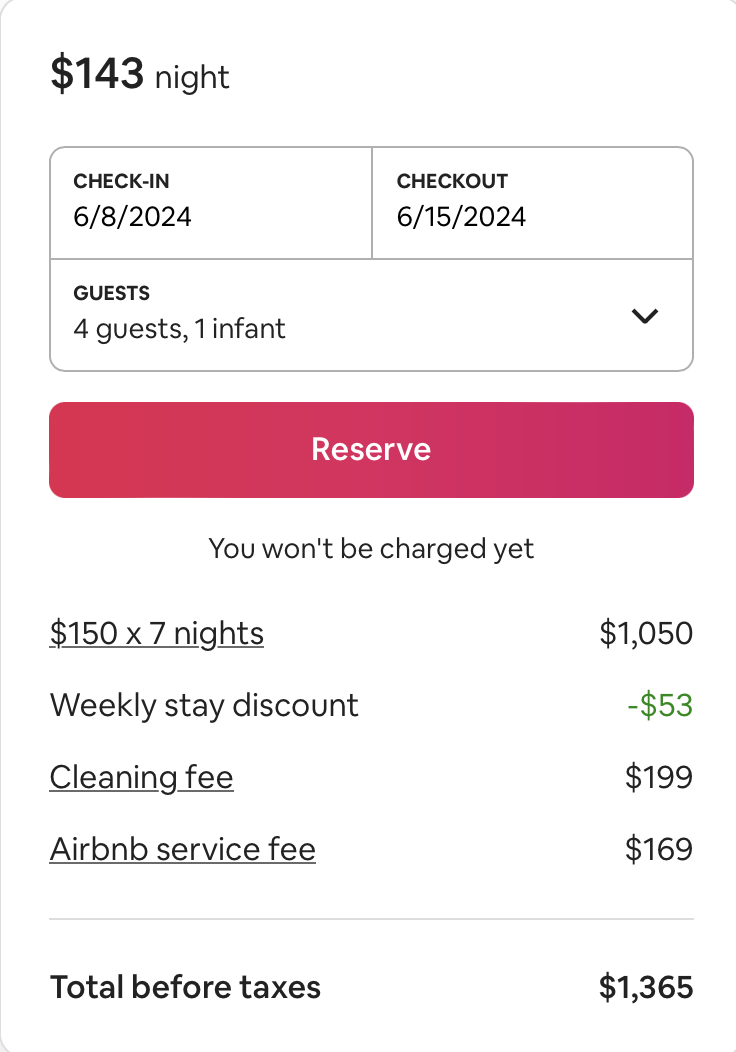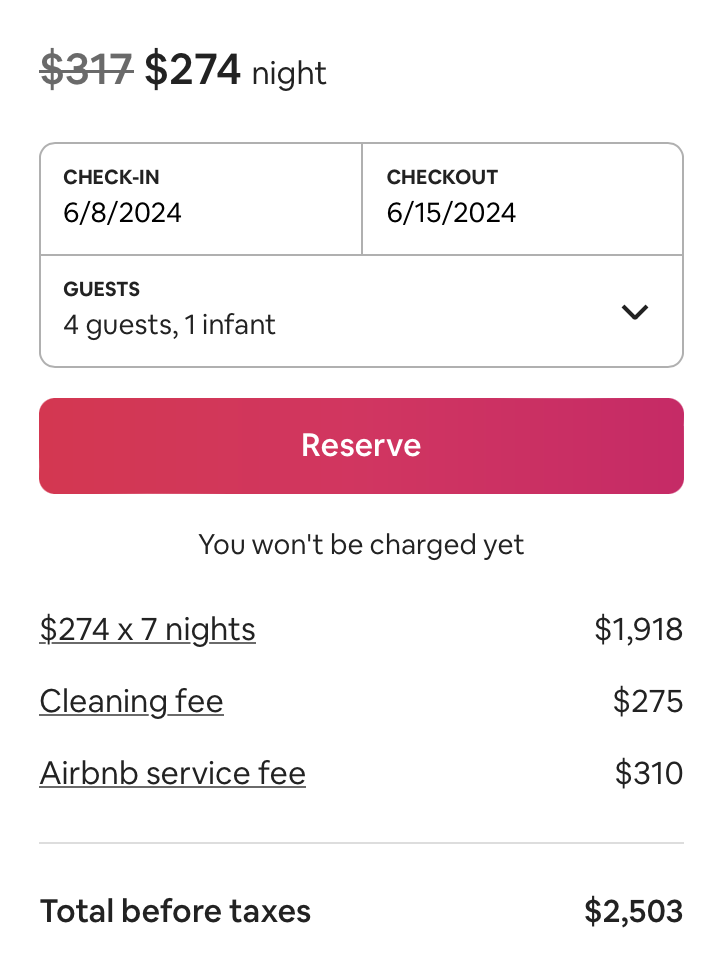Hotels have come under scrutiny for adding in junk fees, something the Biden administration has been working hard to eliminate. But it’s far worse in the Airbnb Homeshare market.
If you are considering booking travel or signing up for a new credit card please click here. Both support LiveAndLetsFly.com.
If you haven’t followed us on Facebook or Instagram, add us today.
Airbnb, Homeshares Fraught With Fees
After a long lapse using homeshare services like Airbnb, my family revisited it this week for a trip to Southwest Florida. It’s incredible just how high the fees have climbed and how much of the total spend those fees represent. Cleaning fees, service fees, and then, of course, the actual nightly expense for the property.
I won’t be the first to whine about Airbnb cleaning charges, in fact, in my experience, the cleaning fees really aren’t that high. I would struggle to find a competent top-to-bottom house cleaner for less than the $200 most of these rentals charge. But adding in the cleaning, plus the Airbnb fee, on top of the nightly rate can add up huge. On our recent test we examined four properties in the same market (Fort Myers) for the same period (7-nights) and found the following additional fees as a percentage of the nightly rate:
- 30.2%
- 33.0%
- 34.8%
- 49.2%
That’s a lot of fees and it most negatively impacts the lower end of the market and short term rentals because cleaning fees have a floor of about $200 in the US. For a property that lists $150/night, they have to sell at least three nights just to come to a 50/50 nightly rate to fee ratio, but for properties that start at $500/nt, the cleaning fee is far lower respectively to the entire bill even though the Airbnb commission will remain significant.


More than anything else, the issue is that while homeshare rental properties must disclose their fees entirely, they don’t have to do it in the leading rate. Airbnb properties can advertise $106/night as one homeowner did:
- $109 x 7 nights ($765)
- -$23 Weekly stay discount
- $230 Cleaning fee
- $137 Airbnb service fee
In fact, for this vacation rental the effectual nightly rate was $158.43. That’s a bump of just a hair under 50% per night.
Transparency Regulations For Hotels, Resorts
States like New York and California have attempted to ban “junk fees” and include these mandatory costs in the price of the product. According to the Global Hospitality Group, California’s SB 478 will have the following impact:
| The Hidden Fee | Potential Impact of SB 478 |
| Hotel Resort Fees | Require hotels to include mandatory resort fees in the advertised price, giving consumers a more accurate upfront picture of the total cost. |
| Hotel Parking Fees | Require hotels to include parking fees in the advertised nightly rate or clearly display them during the booking process. |
| Early Check-In/Late Check-Out Fees (Hotels) | Require hotels to disclose any fees associated with early check-in or late check-out during the booking process. |
| Minibar Charges (Hotels) | Require hotels to clearly list minibar prices or disclose a flat minibar fee upfront. |
| In-Room Internet Fees (Hotels) | Require hotels to disclose any in-room internet fees during booking clearly. |
| Restaurant Convenience Fees (Online Ordering) | Require restaurants to disclose any added fees for using the online ordering platform. |
| Restaurant Service Charges | Require restaurants to clearly disclose any mandatory service charges on the menu or before ordering. |
| Restaurant Split-Check Fees | Require restaurants to disclose any fees for splitting a bill amongst multiple diners. |
| Restaurant Health Insurance Surcharges | Require transparency about any surcharges applied to cover rising employee healthcare costs. |
| Airline Baggage Fees | Require airlines to clearly disclose all fees upfront, including baggage fees, during the initial fare display. |
| Gym Membership Contracts | Require gyms to provide clear and concise contracts outlining all membership fees, including monthly costs, additional service charges, and cancellation policies. |
| Streaming Service Fees | Require streaming services to clearly display the total cost based on chosen features, including any additional monthly fees. |
| Ticketing Service Fees | Require ticketing services to include all fees in the upfront price displayed for the ticket. |
You’ll notice that the homeshare business is excluded from the hotel section and it does not apply.
President Joe Biden’s administration has made junk fees and fair pricing a focus.
Still Airbnb in particular showcases three prices on their selection pages. First, almost always is a grayed out stricken price because the property is featuring a discount – a perpetual discount, but one all the same. Then in bold, the price is listed as “[number in local currency] night” followed by an underlined grayed “[number in local currency] total”.

The problem is that the nightly rate, isn’t really the nightly rate because you can’t stay in that property for that rate without paying Airbnb’s fee and the cleaning fee. It’s impossible, and the fees are not optional. It’s not an additional service, it’s mandatory and part of the fare.
One way that discount carriers have gotten around this is to charge a fee for booking over the phone (because you have free options that don’t require this convenient service.) It used to be that fares were more expensive purchased at the airport incurring ticketing fees, but since everyone buys everything online, it’s now fee-free to buy at the airport, but there’s a convenience fee to buy online. But even ULCC carriers like Spirit and Frontier disclose them in full online. That’s why you can always score a better deal buying at the airport. The only way these fees are legal is because they have to be for an optional service.
That’s where this is different. Airbnb is saying the word “night” after a rate associated with what the Airbnb owner is charging on a nightly basis. That’s the nightly rate – but it’s just not, and sometimes, it’s not half of the true cost. Airbnb is testing a toggle feature in the upper right hand corner of the screen that displays a “total before taxes” and simplifies the purchase to one price point – but, and this is very important – excludes a nightly rate. This matters because now it’s harder to quickly compare to hotels where a nightly rate is used, or for longer stays, executive apartments.
Market Forces May Come To The Rescue
Many travelers have pulled back from Airbnb due to the onerous task of checking out that includes essentially elaborate, high touch cleaning processes, and then paying a cleaning fee, usually substantial in nature.
“With a higher [cleaning] fee, guests may expect to just walk away from your space at checkout as they would a hotel room,” according to a memo posted to Airbnb’s website before the cleaning changes kicked in…
“If they pay a cleaning fee, they sometimes leave the place looking like it’s been lived in and uncleaned for months,” he says, adding that he has returned to find food all over the floor and drinks spilled on the beds.” – NerdWallet
Others described a list that includes taking out the trash, starting a load of laundry, and washing the dishes on top of a cleaning fee.
There’s constant pressure from an ever-expanding Airbnb ownership network which is cannibalizing pricing structure and placing more pressure on owners to show a more competitive upfront price.
“All this is encouraging a hospitality-industry doom loop: If hosts see their bookings drop, they might try to raise rates to make up for it (or at least resist lowering them), which drives guests back to hotels or the cheapest Airbnbs that tend to be run by bigger professional hosts who can afford to cut prices in ways small hosts can’t. If hosts try to lower rates to draw in more bookings, they might still be unable to turn a profit. “For both the guest and the host, it’s just not a good value proposition anymore,” says Wright.” – Vox
Marriott and Hyatt are now in the homeshare game, so are some premium boutique operators, and Inspirato on a premium subscription level. That creates some competition for Airbnb to “get [their] house in order” as CEO Chesky stated they would. But guests like myself and my family simply look at a weeklong stay and compare to a comparable hotel. If the total cost is less for one or the other then it comes down to inclusions. Every stay, I can make a choice on where I stay.
But if we are going to hold the hotels and resorts to account for showing mandatory costs in their nightly rate, why do homeshares get a pass?
Conclusion
Property owners aren’t in the wrong for charging a cleaning fee, and in most cases, the fee is fair. They also have to compete in the market for which they operate. However, showing a nightly rate that does not comport to the cost of that night, regardless of the fees or industry, it shouldn’t be allowed. Transparency in pricing is critical. And if states like California, or the Biden Administration is serious about it, they will enforce pricing transparency regardless of the venue.
What do you think?




I’m a bit confused regarding what exactly is your issue regarding AirBnb. The cleaning fee is disclosed up front and very clear where AirBnb shows you the calculated fee for the stay. How it affects the nightly rate depends upon the length of the stay.
My partner and I have 2 different AirBnb’s that we rent, and stay at them frequently all over the world. Their costs and fees are always very clear and much more transparent than the costs of a hotel room (once all fees, taxes, etc. are disclosed). It’s important to remember that an AirBnb is not a hotel, but a short term rental of a home (in nearly all situations there is no concierge, no room service, no daily maid service, etc.).
I understand why consumers wanted the government to step in regarding the games the large hotel chains (and airlines) are playing with shifting their costs and fees around to the point where a consumer isn’t able to figure out the cost of a room (or a flight) until the very end of a booking. The games played there were a joke, and a blatant attempt to misinform the guest. To lump AirBnb together with the hotel chains (and airlines) is simply disingenuous as there are no surprises.
Not liking the costs of a short term rental is a different issue.
Like a lot of the ‘gig economy ‘, Airbnb is a load of rubbish. Staying somewhere without 24/7 reception and with potentially limited security (good luck if there are physical keys, the world and its dogs will have copies) can only be justified if it’s massively cheaper than a cheap hotel, which Airbnb isn’t. And that’s before we talk about unfair competition – it’s not just the fee structure. Hotels have to comply with huge amounts of regulation from town planning and employment law to fire safety, while Airbnbs don’t. I suppose it’s helpful in adding supply to the market and preventing hotel rates from climbing too far, but the value proposition looks super weak from my perspective.
Agree with PM above. Since most of what rents these places are white trash and minorities looking to party, they divide the rate so many times the fees don’t matter to them. And anyone that is ok with these strangers F’ing in their bed needs to find a job. This industry is collapsing and the day it goes away, the better we are as a nation.
There’s a reason why you and your family stayed away from these hustlers for a while as you stated Kyle.
I still think the AIRBNB services are over the top in most areas.. and what is that for??? paying AIRBNB to advertise on their website????
You start with a bold argument that AirBNB’s and the like NEED price regulation by the government.
What follows is a long, winding road of words which never comes back to drive home the main point (regulation) that you are trying to contend.
In fact, you actually provide rebuttal evidence for your own position by showing how AirBNB already does fully disclose all fees, taxes, etc. So what’s the problem here? You want a fully itemized cost breakdown for each unit on the search landing page without having to click on the particular rental unit? This is just really confusing, especially when you come out bodly claiming that you’ve got an issue that is so bad that it necessitates governmental intervention…
It would be nice if congress fixed this, but why would they? Eliminating junk fees and confusing pricing only helps consumers. Consumers vote, but they don’t contribute to campaigns. As long as both parties continue to get contributions from companies and wealthy people who stand to benefit from this practice, there’s no incentive to change it.
I’ve seent the AirBnB service fee go as high as 35% in some cases and of course it’s there to ‘safeguard’ you. Then when you have a problem, all you get from them is push back to sort it out yourself.
There’s also now a fee for paying in a different currency to the one quoted so to avoid that you need to change to pay in the currency of the country you are renting in especially if you use something like a Wise card with good rates for paying in any currency.
Equally, I now no longer follow the check out instructions on any sort of cleaning because I’m paying for it and not about to follow a list of instructions to do it myself.
AirBnB needs a big investigation and fees need reigning in. Given their market dominence, this might be a good one for the European Commission at least on this side of the pond.
I just take the extra fees as a given, look at the nightly rate and then compare that with hotels/other AirBnB-type establishments in the area I want to stay. I really have better things to do with my time than deconstruct elements of pricing which are clear and upfront.
I personally think BnB’s are too high. But, get the government out of it. Let the free market do its thing and a competitor will come into the market or they will adjust their prices to become competititve. If the government gets involved then it will only muck it up.